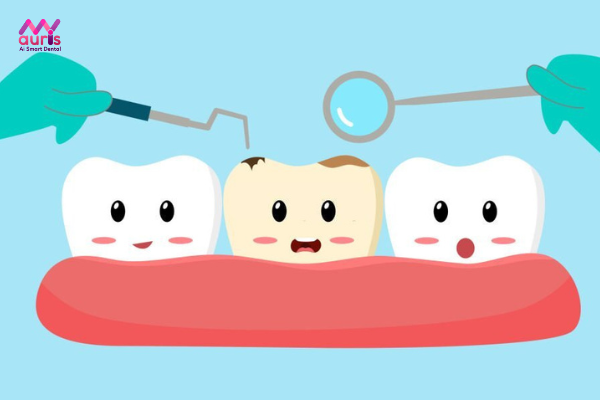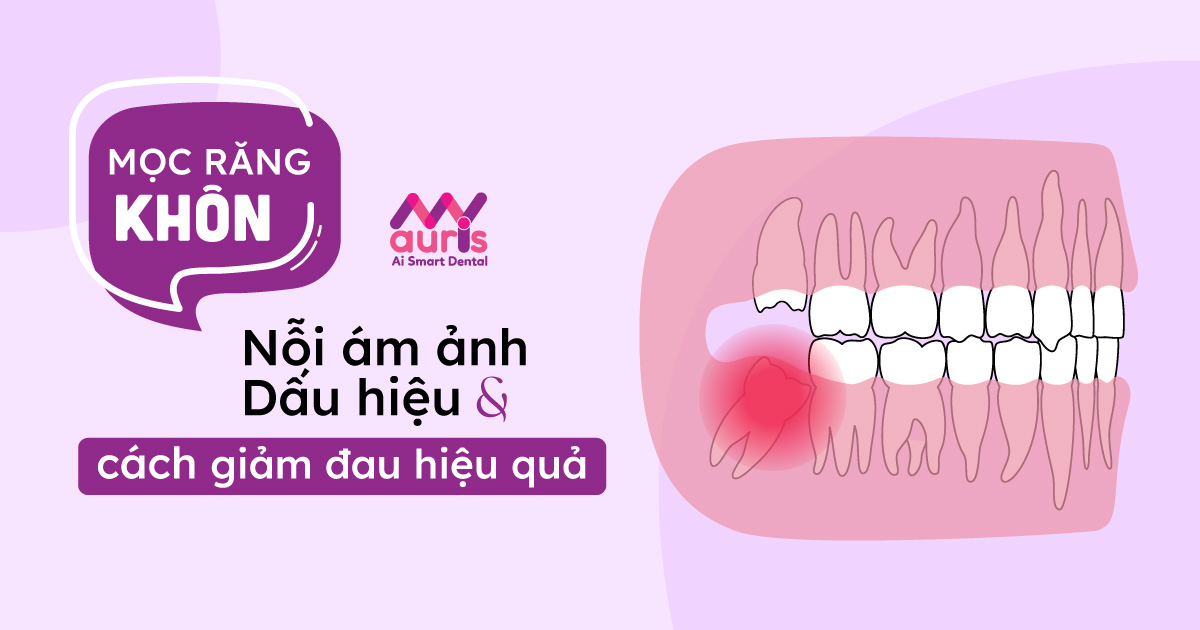Growing wisdom teeth is always a fear for many people because when this tooth grows abnormally, it often tilts or pierces adjacent teeth, causing the patient to always feel pain and discomfort, and causing many other dangerous complications. However, not everyone knows when wisdom teeth will erupt because there are no specific symptoms. If you are experiencing one of the 6 signs of wisdom tooth growth below, quickly see a doctor for examination and treatment to avoid the dangers caused by this “troublesome” tooth!
1. 6 signs of wisdom teeth growth
The wisdom teeth growth process does not take place continuously. Depending on each person’s constitution, there will be different time periods from 3 – 5 months or more. Therefore, not all customers have the same symptoms of wisdom teeth growth. Below are some of the most common symptoms of wisdom teeth growth that you can refer to:
-
Swollen or red gums
The phenomenon of swollen or red gums is quite common and almost everyone experiences when wisdom teeth grow. Because when impacted wisdom teeth have not fully emerged, the surrounding gums will be damaged and swollen. You can easily recognize this condition when wisdom teeth grow in the lower jaw. In the case of wisdom teeth growing above, you can use your tongue to check to feel the swelling of the gums.
-
Unusual fever
In some cases Wisdom teeth can cause prolonged fever. The reason is that when wisdom teeth emerge, they break the barrier of the mucous layer in the oral cavity. At this time, the bacteria accumulated in plaque have the opportunity to overflow, causing the gum area around the wisdom teeth to become inflamed. At the same time, the body’s immune system begins to react with inflammation, causing fever along with pain and discomfort.
-
Pain
Toothache is the most common symptom of wisdom teeth growth. The reason is that when they emerge, wisdom teeth irritate the gum tissue. Although this condition is completely normal when wisdom teeth grow, it still makes us feel uncomfortable. Some people can’t even eat or drink and can’t sleep because of the constant pain. Normally, this pain will last for a few weeks, but if you feel the pain is more intense and lasts longer, you should reconsider because the wisdom tooth may be stuck in the jawbone.
-
Bad breath bear
If wisdom teeth grow crooked or partially grow, the remaining part is covered by gums over the wisdom teeth, then small pockets may be created under the flap around the tooth crown. This causes leftover food to get stuck and cannot be cleaned, creating conditions for bacteria to grow and develop. That leads to tThe condition of bad breath.
-
No longer feels good about eating and drinking
When wisdom teeth start to grow, your body will feel tired, bored, and uncomfortable. If this condition lasts for a long time, you will feel anorexia because you no longer feel delicious when eating.
-
The jaw is stiff, difficult to move
This is also one of the easily recognizable symptoms when wisdom teeth appear. The cause is that the gums are swollen and painful, causing the jaw muscles to become stiff and difficult to move, leading to reduced chewing function.

2. Are wisdom teeth growing dangerous?
Many people subjectively believe that the symptoms of fever, swollen gums or pain when wisdom teeth grow will quickly end when they complete their teething process, so they try to endure it. Although, it is true that when wisdom teeth grow straight, not tilted or crooked, the discomfort will gradually disappear as they emerge straight. On the contrary, if wisdom teeth grow crookedly, the condition will get worse. You will even have to face many dangerous oral health problems caused by complications of impacted wisdom teeth if not treated promptly. Specifically:
-
Tooth decay
This is a very easy condition to see when wisdom teeth grow crookedly. Because wisdom teeth grow at an angle, leaning against neighboring teeth will create a space that causes food to get stuck in and is difficult to clean. This will create favorable opportunities for bacteria to grow and destroy tooth structure. As the decay becomes more severe, it will spread, affecting tooth number 7. If not treated promptly, tooth number 7 may have to be removed.
-
Gingivitis
Gingivitis is a common disease when wisdom teeth grow. The gums on the surface of the wisdom teeth will hinder the development of the wisdom teeth. As wisdom teeth continue to grow, they will push the gums up, creating a small gap that causes food to get stuck in. Over time, if not cleaned properly, bacteria will breed and attack the gums. This leads to gingivitis.
Gingivitis will become more severe if wisdom teeth grow crookedly or obliquely into adjacent teeth. Not only does it cause the jaw to become misaligned, it affects the tnot only affects the aesthetics of your teeth but can also spread infection to adjacent teeth. Symptoms of this condition are the dull pain and sensitivity of the adjacent teeth when eating foods that are too cold or too hot.
-
Cyst condition
If wisdom teeth grow crookedly, if not treated promptly, they can cause jaw cysts. This condition can damage the jawbone, teeth and nerves. In severe cases, tissue and bone will have to be removed, seriously affecting oral health.
-
Reflex and sensory disorders
Because the face has many nerves, when wisdom teeth grow crooked, tilted or impacted, they will press on the nerves, causing loss or reduction of sensation in the lips, skin, mucous membranes and teeth in the jaw. In addition, wisdom teeth can also cause sympathetic syndrome: pain on one side of the face, red edema around the eye socket.
-
Affects the soft tissues in the mouth
In some cases, wisdom teeth growing outward and hitting the cheek can cause deep damage to the cheek area and cause infection. If the wisdom teeth are displaced inwards, there is a possibility of tongue damage because the tongue must constantly work when eating, chewing, and talking.
-
Tooth abscess
If the gums at the location where wisdom teeth grow are infected, they will create favorable conditions for bacteria to penetrate inside the teeth, thereby forming abscesses. These tooth abscesses will damage the teeth and affect the nerves inside if not treated promptly. This complication is quite dangerous because pus from a tooth abscess can cause suffocation if it flows down the throat, cause a mediastinal abscess if it flows into the mediastinum, …

3. What to do when you have symptoms of wisdom teeth growth?
Symptoms of wisdom teeth growth in adults are often quite complicated. Among them, pain and inflammation are the most common signs of wisdom teeth growth. You can completely control this condition with a number of measures such as:
- Using salt water: When wisdom teeth grow, the gums will be red and swollen, very susceptible to infection. Therefore, you should rinse your mouth with diluted warm salt water twice a day in the morning and evening to help fight inflammation and bacteria at the wisdom tooth site.
- Apply ice: The gum area at the location of wisdom teeth often swells and affects the nerves, causing headaches. When you have this condition, you can use cold ice to gently rub the small nerves on the back of your hand, where it forms a V between the thumb and index finger, to stimulate an area of the brain, thereby helping to prevent pain.
- Using pain relievers: This is the choice of most patients when showing signs of wisdom teeth growing. However, a doctor’s prescription is required. Do not use it arbitrarily to avoid dangerous health consequences.

However, in the case of wisdom teeth that are not only painful but also accompanied by symptoms of infection, tooth decay, … or tend to pierce adjacent teeth, the best way is to go to a reputable dental clinic for examination to accurately diagnose the condition of your wisdom teeth. Examination not only helps you accurately detect the direction in which wisdom teeth grow and when they erupt, but also helps you effectively control them to minimize dangerous health complications.
The above are the symptoms of wisdom teeth growth that we often encounter. If you still cannot accurately determine whether your case is a sign of wisdom teeth or not, or if you feel excessive pain in the innermost tooth position, please contact My Auris dental experts immediately for examination and advice on the best treatment for your condition!
>>> See more:How long does wisdom teeth hurt





